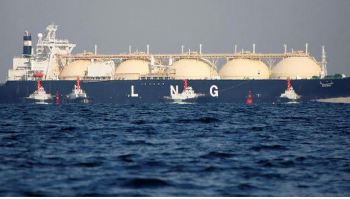Islamabad preparing to secure Gulf state’s consent to either cancel shipments or sell them on spot market
DNA
ISLAMABAD: The government will approach Qatar seeking the Gulf state’s permission to resell the liquefied natural gas (LNG) imported from Doha in the spot market in case there’s low domestic demand, quoting a senior senior official from the Ministry of Energy a Pakistani newspaper reported.
The revelation comes in light of the long-term LNG supply contract signed between Islamabad and Doha back in 2016. The price revision under the contract is due in February 2026.
Under the agreement, Pakistan State Oil (PSO) is obligated to take supplies regardless of domestic demand, causing pipeline issues for Sui Northern Gas Pipeline Limited (SNGPL) when the utility fails to consume the gas.
Officials have said that Pakistan is preparing to approach Qatar through diplomatic channels, seeking either to cancel shipments or sell them on the spot market if domestic demand for LNG falls short.
The disclosure was made during a public hearing held on Friday by the National Electric Power Regulatory Authority (Nepra) regarding a petition by power distribution companies seeking permission to collect an additional Rs3.41 per unit from consumers due to fuel adjustments for May 2024.
During the hearing, power distribution companies noted that the actual fuel rate was Rs9.12 per unit, compared to a reference price of Rs5.7 per unit, resulting in an increase of Rs3.41 per unit.
They also reported a 5% drop in electricity consumption due to weather conditions, with total demand in May 2024 being only 17,000 megawatts. More electricity was produced using LNG rather than coal, with the cost of LNG-based electricity standing at Rs24.7 per unit.
Elaborating on the need to forecast LNG demand months in advance, the officials highlighted that unexpected drops in power-sector consumption can lead to increased line pack for gas utilities.
Their worry can be referred to the increased line pack pressure back in May which had put the country’s gas transmission at risk as it soared to critical levels owing to the reduction in the use of Re-Gasified Liquefied Natural Gas (RLNG) by the power sector.
Furthermore, hearing also revealed that the share of net metering in the total energy mix was less than 1%.
Accusing the Power Division of propaganda to discourage net metering by emphasising its minimal share, the intervenors claimed that net metering users were consuming more electricity from the national grid at night, suggesting that criticism against net metering was baseless.
They also further questioned the National Electric Power Regulatory Authority’s (Nepra) role in providing relief over the last five years and criticised it for depriving power consumers of the option to pay bills in instalments.
Additionally, questions were also raised about a coal scam at the Sahiwal coal power plant, cases lost by the Central Power Purchasing Agency (CPPA) in international courts; and the rising circular debt in the power sector.
Meanwhile, arguing on behalf of the power distribution companies, the CPPA refused to address the aforesaid queries stressing that they were not relevant to the public hearing and requested the intervenors to submit their queries in writing.

















